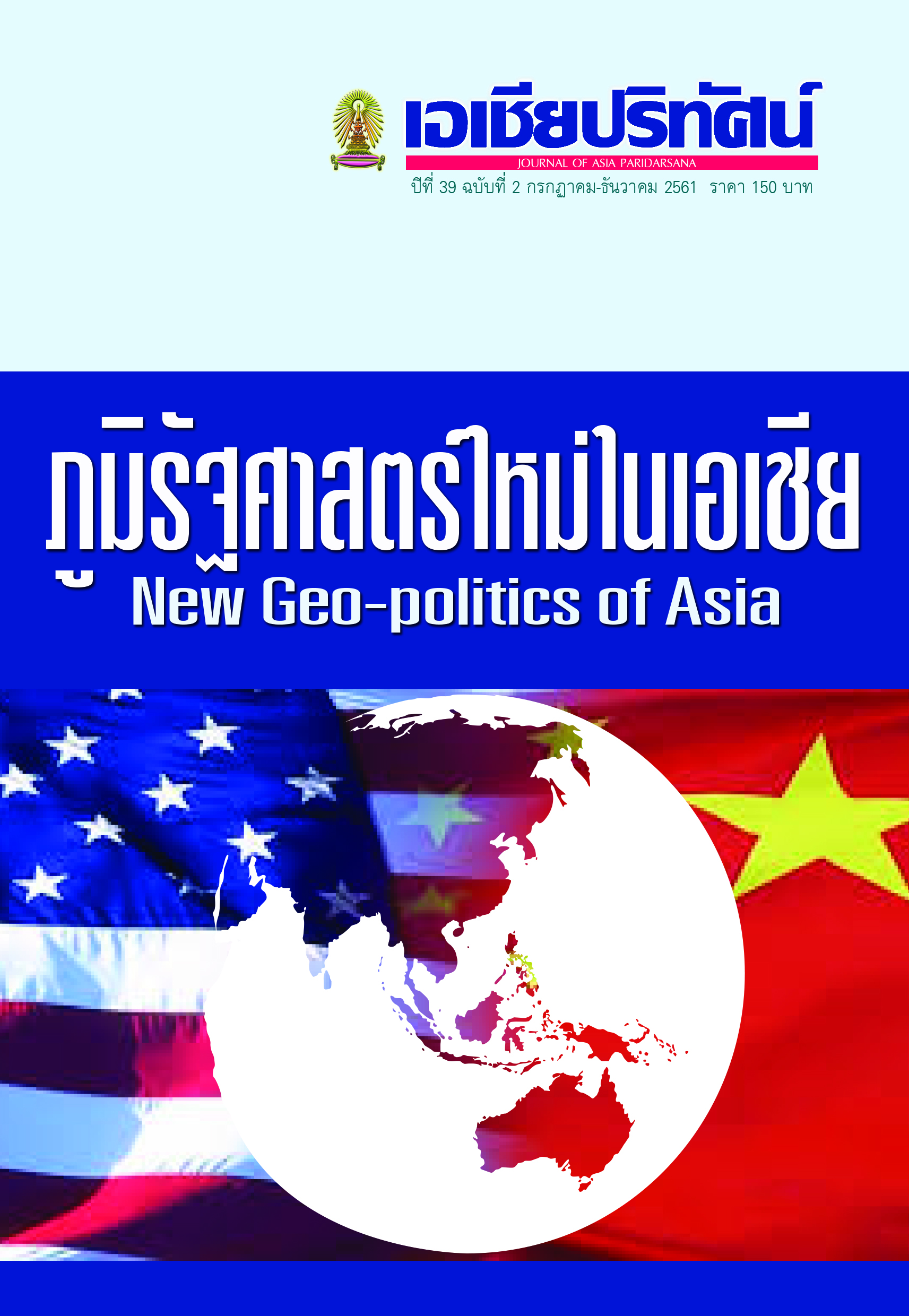พลวัตความสัมพันธ์ระหว่างตุรกีกับตะวันออกกลาง: พัฒนาการและที่ทางของความสัมพันธ์
Main Article Content
Abstract
Relations between Turkey and the Middle East have been in existence for a long time. During the period of the Ottoman Empire, in particular, this region was governed by Turks. Following the establishment of the Republic of Turkey before 2002, the relationship of Turkey with this region experienced a sharp downturn, because Turkey at that time emphasized its relations with the West, either this involved the United States or Europe. The relationship started to be on the rise again as a result of the exportoriented policy of President Ozal, which encouraged the Turkish to return to this region. Besides, the rise in violence perpetrated by the Kurds in Turkey and the neighboring countries has become their common problem stimulating the Turkish role in this region. Turkey’s relations with the Middle East have resumed prominence after the Justice and Development Party came to power in 2002. Emphasizing a friendly and proactive foreign policy, Turkey has reshaped its relations with all countries in the region. But after the Arab Spring, trends in the relationship have turned to be predominantly security-based. At the same time, in view of the context of internal politics in each country, merely a positive policy is not enough. This article then attempts to discuss the dynamics of relations before and after 2002 in order to see the development and position of Turkey in the Middle East.
Article Details
References
Altunişik, Meliha Benli. 2014. “Turkey as an ‘emerging donor’ and the Arab uprisings.” Mediterranean Politics 19(3): 333-350.
Aslan, Davut Han. 2015. “Turkish-Iranian Relations. The Past, Present and Future.” Zeszyty Naukowe Uczelni Vistula 41(3): 58-69.
“Iraq Supreme Court Rules Kurdish Referendum Unconstitutional.” 2017. BBC, Accessed October 1, 2018. https://www.bbc.com/news/worldmiddle-east-42053283
Carley, Patricia. 1995. A Conference Report: Turkey’s Role in the Middle East. Washington D.C.: The United States Institute of Peace.
Cook, Steven A. and Hussein Ibish. 2017. “Turkey and the GCC: Cooperation Amid Diverging Interests.” Washington, DC: The Arab Gulf States Institute in Washington (AGSIW). Accessed October 2, 2018. https:// agsiw.org/wp-content/uploads/2017/02 /GCCTurkeyONLINE-2.pdf
Dalay, Galip. 2018. “Turkey in the Middle East’s new battle lines.” Brookings Institution, 25 September. https://www.brookings.edu/ opinions/the-middle-easts-new-battle-lines/
D’Alema, Francesco. 2017. “The Evolution of Turkey’s Syria Policy.” Istituto Affari Internazionali, October, http://www.iai.it/en/pubblicazioni/evolution-turkeys-syria-policy.
Demir, Idris. 2017. Turkey’s Foreign Policy Towards the Middle East: Under the Shadow of the Arab Spring. Newcastle upon Tyne: Cambridge Scholars Publishing.
Efron, Shira. 2018. “The Future of Israeli-Turkish Relations.” The RAND Corporation, Accessed October 3, 2018. https://www.rand.org/ content/dam/rand/pubs/ research_reports/ RR2400/RR2445/ RAND_RR2445.pdf
“Global Humanitarian Assistance Report 2018.” 2018. Development Initiatives, September 30. http://devinit.org/post/global-humanita rian-assistance-report-2018/
Gülseven, Enver. 2010. “Identity security and Turkish foreign policy in the post-cold war period: Relations with the EU, Greece and the Middle East.” PhD diss., School of Social Sciences. Brunel University.
Keyman, Emin Fuat. 2017. “A New Turkish Foreign Policy: Towards Proactive “Moral Realism”.” Insight Turkey 19(1): 55-69.
Laçiner, Sedat. 2003 “Özalism (Neo-Ottomanism): An Alternative in Turkish Foreign Policy?.” Journal of Administrative Sciences 1(1): 161-202.
Olson, Robert. 1997. “Turkey-Syria Relations since the Gulf War: Kurds and Water.” Middle East Policy 5(2): 168-193
Özpek, Burak Bilgehan. 2009. “Irak Bölgesel Kürt Yönetimi Seçimleri ve Türkiye.” Orta Doğu Analiz 9(1): 51-56.
Rudaw. 2018. “Iraq-Turkey Relations ‘Very Important’ Amid Economic Woes: Baghdad.” Rudaw, October 4, 2018. http://www.rudaw.net/ english/middleeast/iraq/15082018
Sattar, Yasmin. 2018. Güney Doğu Asya’nin Çatişma Bölgelerinde Türkiye’nin Varliği ve Etkisi. PhD diss., School of Social Sciences, Istanbul University.
Tait, Robert. 2009. “Turkish PM exposes nuclear rift in Nato.” The Guardian, Accessed October 3, 2018. https://www.theguardian.com/ world/2009/oct/26/turkey-iran
Taşkin, Gizem. 2018. Israeli-occupied Golan Heights: in Pursuit of Regional Hegemony.” TRT World, Accessed October 5, 2018. https://www. trtworld.com/mea/israeli-occupied-golan-heights-in-pursuit-ofregional-hegemony-17913.
“Turkey’s Net ODA.” 2018. OECD Data, September 23, 2018. https:// data.oecd.org/oda/net-oda.htm
Turkish Cooperation and Coordination Agency. 2014. “Turkish Development Assistance 2013.” Accessed September 20, 2018. http://www. tika.gov.tr/upload/publication/KYR_FRAE_2013_uyg9.pdf.
Turkish Cooperation and Coordination Agency. 2015.
“Turkish Development Assistance 2014 Report.” Accessed September 20, 2018. http://www.tika.gov.tr/upload/2016/INGILIZCE%20SITE%20ESERLER/KALKINMA%20RAPORLARI/DA%20Report%202014.pdf.
Turkish Cooperation and Coordination Agency. 2016.” Turkish Development Assistance Report 2015.” Accessed September 20, 2018. http://www.tika.gov.tr/upload/2017/YAYINLAR/TKYR% 202015%20 ENG/KALKINMA%20.pdf
UNHCR. 2018. “Syria Regional Refugee Response.” Accessed October 5, 2018. https://data2.unhcr.org/en/situations/syria


